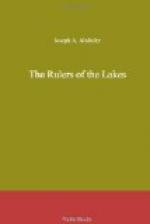To the young Philadelphians and to Grosvenor, the Englishman, who stood by, it was a sight wild and picturesque beyond description. The Mohawks were in full war paint and wore little clothing. Their dark eyes flashed, as the eloquence of Hendrik made the intoxication of battle rise in their veins, and when two hundred tomahawks were swung aloft and whirled about the heads of their owners the sun flashed back from them in glittering rays. Now and then fierce shouts of approval burst forth, and when Hendrik finished and stepped down from the gun carriage, they were ready to start on a march, of which the wise old sachem had not approved.
The militia also were rapidly making ready, and Robert and Tayoga, awakened and refreshed, took their places with the little Philadelphia troop and the young Englishman, Grosvenor. Hendrik was too old and stout to march on foot, and he rode at the head of his warriors on a horse, lent him by Colonel Johnson, an unusual spectacle among the Iroquois, who knew little of horses, and cared less about them.
This was the main force, and the Philadelphia troop, with Robert, Tayoga and Grosvenor, was close behind the Iroquois as they plunged into the deep woods bordering the lake, a mass of tangled wilderness that might well house a thousand ambushes. Grosvenor glanced about him apprehensively.
“I don’t like the looks of it,” he said. “It reminds me too much of the forest into which we marched with Braddock, God rest his soul!”
“I wasn’t there,” said young Captain Colden, “but Heaven knows I’ve heard enough horrible tales about it, and I’ve seen enough of the French and Indians to know they’re expert at deadly snares.”
“But we fight cunning with cunning,” said Robert, cheerfully. “Look at the Mohawks ahead. There are two hundred of ’em, and every one of ’em has a hundred eyes.”
“And look at old Hendrik, trotting along in the very lead on his horse,” said Wilton. “I’m a man of peace, a Quaker, as you know, but my Quakerish soul leaps to see that gallant Indian, old enough to be the grandfather of us all, showing the way.”
“Bravery and self-sacrifice are quite common among Indians. You’ll learn that,” said Robert. “Now, watch with all your eyes, every man of you, and notice anything that stirs in the brush.”
Despite himself, Robert’s own mind turned back to Braddock also, and all the incidents of the forest march that had so terrible an ending. Johnson’s army knew more of the wilderness than Braddock’s, but the hostile force was also far superior to the one that had fought at Duquesne. The French were many times more numerous here than there, and, although he had spoken brave words, his heart sank. Like the old Mohawk chief, he knew the army should not have been divided.
The region was majestic and beautiful. Not far away lay the lake, Andiatarocte, glittering in the sun. Around them stretched the primeval forest, in which the green was touched with the brown of late summer. Above them towered the mountains. The wilderness, picturesque and grand, gave forth no sound, save that of their own marching. The regiments of Williams and Whiting followed the Mohawks, and the New England and New York men were confident.




